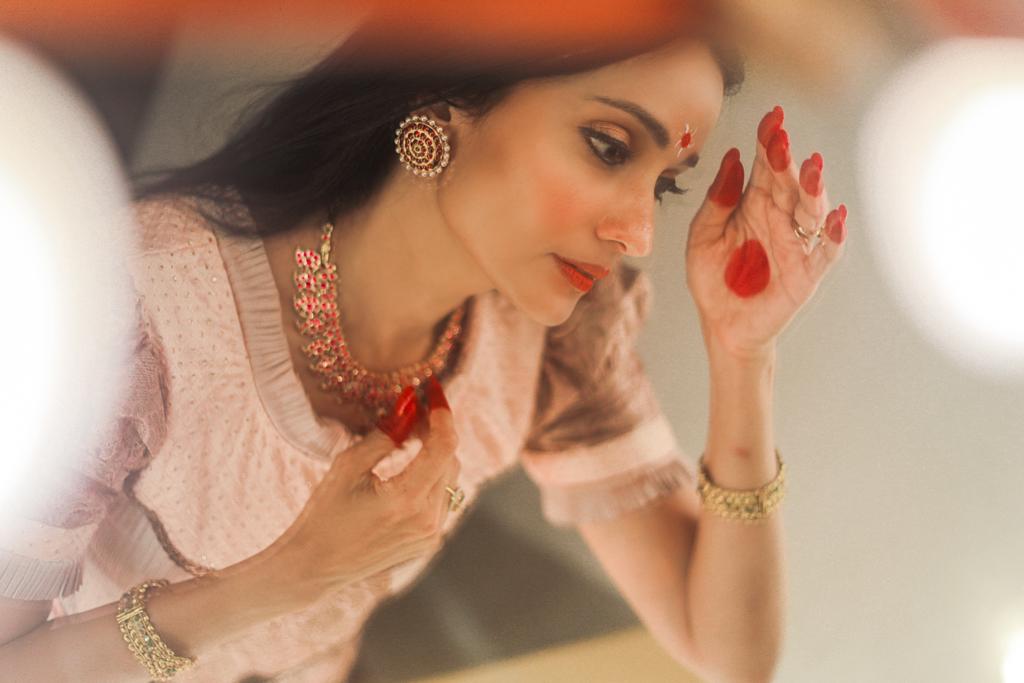
The Perfect Murder
| From ‘Dance of Loneliness in Pursuit’ – ‘Chains’ performance |
The world of art, especially the world of art as created by a woman tends to point out worst-case scenarios as the average truth. We have a lot of blogs, commentaries by fairly renowned women that speak of the need for freedom without boundaries or regard the opposite sex as completely and irrevocably lecherous.
In the world of dance perhaps more so than literature, the plight of a woman is typified by Sita or Draupadi when the subject is women-centric. Women feature in other dance productions, but a Radha is always a step below Krishna; a Parvati is so exalted that her gender does not matter! When it comes to gender inequality, we have two idols in dance – one an ever-suffering woman who loved despite rebuke and rejection from the one she loved. The other woman is feisty and wears the victims-out-for-revenge attitude for the most part of the narrative.
I do not dispute that the victims of heinous crimes do not exist or suffer. I do not dispute that thousands of Indian women put up with atrocities far beyond any logic or reason. But the women I am referring to number in millions – these are everyday women like your mother and sister. They are the founding pillars of the massive and growing middle-class Indian community. A vast majority of these women do not get raped, do not get kicked out of their homes when they are pregnant, do not get stripped in public while their husband watches, nor have husbands who leave them for some higher calling. Does this mean these women do not have any suffering? They do. But what they suffer is so subtle and nuanced in everydayness that they do not even know that this could be classified as suffering. In general a woman who has a husband who gets bread on the table, children who study and top their classes, in-laws who live-in and are supportive, are supposed to have it all. Anything beyond the happiness of this family that the woman seeks is termed as selfish by the society. And therefore we have generations of women who do not even know that they have the permission to dream bigger. The dreams can be for her husband’s promotion, an American university for the son, a multi-national company for the daughter… but for herself it is only vicarious. Even if there is a dream, it would have to fit-in to the scheme of the family’s priorities. More often than not, she herself would put it at the lowest rung. I think the biggest injustice to women-kind is that society has conditioned all to think this is fair and therefore we have a perfect crime. The murder of a dream in the name of family-well-being. And it has been perfected so well that there is no case legally, emotionally, whichever way you look at it.
Why do these women not change their fate, you might ask. If the woman had a drunk husband who would beat her or a sarcastic mother-in-law who would torture her, society makes for a case for her to leave them. More often than not, the husband is not a decrepit soul who willingly inflicts the suffering on purpose. He has been conditioned to be apathetic to the woman’s dreams. He believes that whatever her needs are, are met by him. How do you leave this man? He is loving, he does everything the society expects of him for his wife and his family.
The proof of this revelation to me came from ‘Chains’ – my latest production. The one refrain I heard from the women audience everywhere it was performed, and this includes China, was that it was their story. A sprightly young girl with stars in her eyes morphs into a dutiful robot who acts her role in a family and finally ends up as an old woman preferring solitude for company – this was not what the young girl dreamed of becoming. But this is what she became. Do we even acknowledge that this is a tragedy that has happened?
I think liberation is about respecting equality of choices within the family parameters. It is not dissolving parameters altogether so a woman could do pretty much anything she wants.



